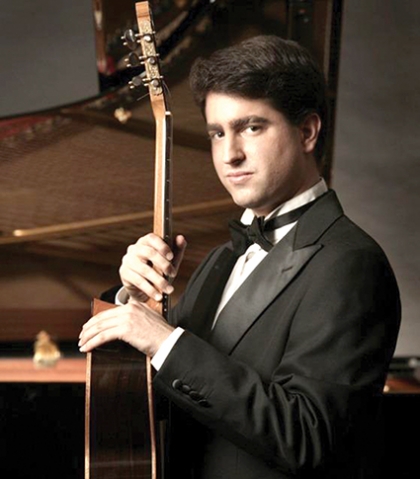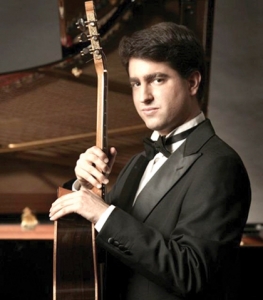Rafael Aguirre in Tbilisi: Unexpected Things in a Predictable World
It was the most important classical guitar concert in Georgia in decades. But Aguirre’s virtuosity was not only seen in his creating an impossible range of sounds with his guitar; it was in keeping a note dying for the exact amount of time, making the audience hold their breath just so. Aguirre made his listeners an essential part of a memorable concert.
It was of mathematical beauty, the lapse of time a single note would be left reverberating in the air: any other second would be annoyingly long, one less, unforgivably short. And Aguirre knew, as he knew how to make the audience a part of his music, as if he were an orchestral director, and we the musicians: “The audience is to a large extent responsible for how a performance goes. A concert is an act of mutual communication between the artist and the public, and music is in the middle, creating the perfect bond,” he says.
Aguirre started developing the capacity to feel his audience at the age of eight, when he began giving concerts: “I feel the way people listen and from that one can learn how a country listens. Here in Tbilisi I felt that the people attending the concert were very curious at the beginning, and then at the end it seemed like they were delighted, and the mix of their reaction with the beauty of the Rustaveli Theater was just amazing”.
The Spanish virtuoso was there indeed, and at the same time he wasn’t. Seeing him playing, sometimes with his eyes closed, one could feel that he was very far away: “Music has the power to bring you to another place. Like, for example, when I play music by composer Erik Satie I am in a quiet world, with just a few sounds- I imagine myself in Paris or perhaps in an imaginary world.”
Aguirre spoke to GEORGIA TODAY just hours before the start of the concert. The theater is empty, as is the stage. Behind the wings, some props from past performances, an old cardboard horse among them. That night, when the concert starts, Aguirre’s strumming seems to echo the horse’s trot on his way to that imaginary world.
“Music makes unexpected things happen in a predictable world. Music is abstraction. Music goes beyond objective parameters, beyond what can be measured and counted”. This is the magic world Aguirre has inhabited since the age of 6. “I did not chose the guitar, it chose me” he declares. “I was studying in the Conservatory and had to choose between piano or guitar, and even the night before I still hadn’t decided. We are so obsessed with planning our lives, we don’t realise that it is life that plans us.”
“Then one day I was at home, I was about 8. I was sitting in the sofa, my feet not yet able to reach the floor, listening to an album featuring several musicians, Narciso Yepes among them. I was bewitched. I could barely pull a few sounds from my guitar and that man could produce millions… I felt something I had never felt, it’s difficult to explain but it was like a spiritual revelation, I deeply came to know that that would be my world”.
Aguirre goes on to tell us how back then he thought he would never be able to imitate Yepes’ virtuosity. Time proved him wrong. 13 first prizes at international competitions and recitals in leading concert halls such as the Carnegie Hall, the Vienna Konzerthaus and the Tchaikovsky Hall in Moscow are the proof.
Sitting in one of the maroon velvet chairs in the empty theater, Aguirre, talkative, funny and wise, makes no mention of these achievements, and instead talks about what real success means to him: “My aim is for people to experience some sort of transformation through the music, to leave the theater different to the person they were at the beginning of the concert.” For him, this goes beyond mere pleasure, and in our time is rather a need: “We live in a society based on the visual, starting from mobiles and the internet. But it is through the ear that we reach the most spiritual, the deepest connection to the world. This is why concerts are so necessary.”
At the end of the concert, the compositions of Enrique Granados and Vicente Amigo take us from a rainy fall to open summer parties and paper chains of light. Notes reverberate like the aftertaste of wine and laughter, awakening strange corners of ourselves. The verses of Spanish poet Federico García Lorca gain life through Aguirre’s fingers: “the weeping of the guitar (…) how southern sands yell for white camellias.” Flowers that, in Aguirre’s world, blend with the scents of fruit and incense that he links to Georgia. “Notes die in a different way in every place; there is something distinctive in the way music penetrates people in each part of the world.”
To Aguirre’s world of camellias, fruit and incense perhaps even that cardboard horse is heading. Free but enslaved, because, in the virtuoso’s words: “When music is played properly it hooks you and you can’t escape.”
María José Riquelme del Valle











